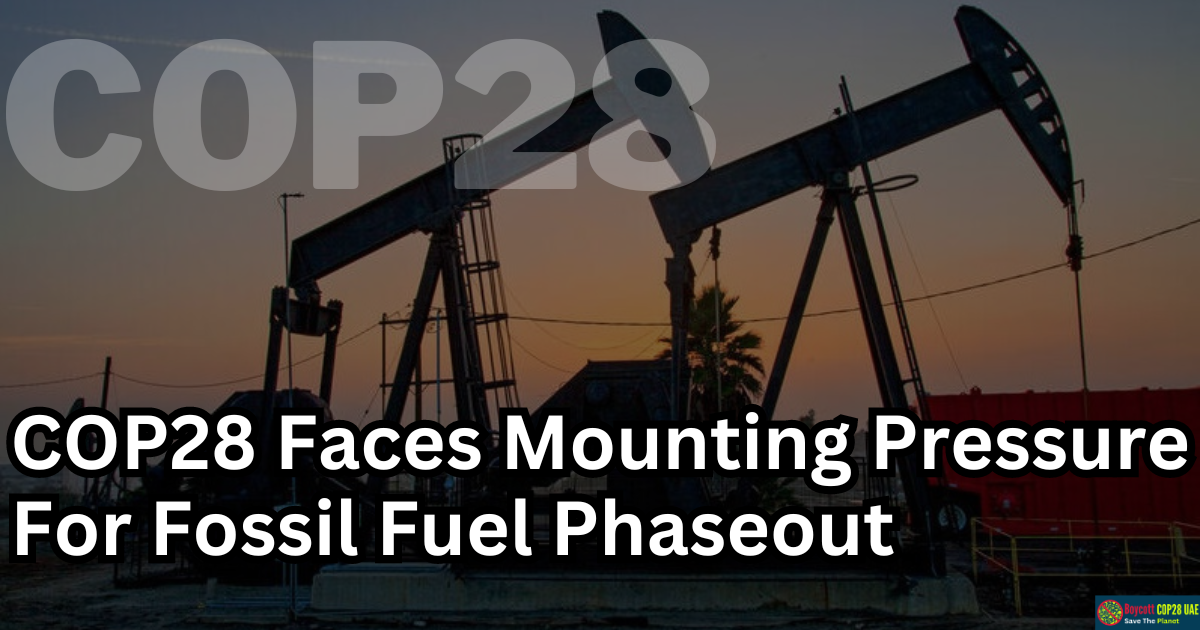Following a groundbreaking UN Climate Ambition Summit, the upcoming COP28 conference in Dubai is under unprecedented scrutiny as world leaders have called out the fossil fuel industry for its pivotal role in the global climate crisis. Advocates tracking the talks in New York reported a notable shift in rhetoric, with multiple leaders urging a swift reduction in fossil fuel consumption, a move deemed imperative to achieve the objectives outlined in the 2015 Paris Agreement.
UN Secretary-General António Guterres presided over the summit, which, while light on groundbreaking commitments, witnessed a remarkable chorus of voices demanding a reduction in fossil fuel use. Observers noted that this call for change marked a distinct departure from previous climate summits.
Tina Stege, the climate envoy for the Marshall Islands, remarked, “It was the first time I had been in a room where I did feel this shift around the ability to say ‘fossil fuel,’ and say it again and again.” She further emphasized that in contrast to previous gatherings, the call for action was not limited to a lone activist group but resonated widely.
Leaders like German Chancellor Olaf Scholz and Kausea Natano, Prime Minister of Tuvalu, specifically called for the gradual phase-down of fossil fuels to align with the Paris Agreement’s goals of curbing rising global temperatures. Although Guterres invited leaders from approximately 30 countries to speak at the summit, they collectively accounted for only about 17% of global emissions. Notably, heads of state from some of the world’s largest emitters, including China, the United States, and India, were conspicuously absent.
Romain Ioualalen from Oil Change International, an activist group, expressed his disappointment, stating, “Really, it’s striking that the leadership on display at the summit is primarily coming from Global South countries, and that’s a disgrace. That’s a shame.”
Selwin Hart, a top climate adviser to Guterres, acknowledged that one summit alone would not resolve the climate crisis but argued that the event underscored the presence of leaders willing to intensify their efforts ahead of COP28.
“In my view, it is the most important COP since Paris,” Hart asserted at the Climate Analytics event. “Because it’s a COP that sets the stage for what needs to be done to close glaring gaps to meet the temperature goal, the finance, and adaptation goals in the Paris Agreement.”
UAE’s Role in COP28 And The Challenge of Fossil Fuels
The upcoming COP28 conference, set to take place in the United Arab Emirates (UAE), faces distinctive challenges due to the nation’s significant reliance on oil and fossil fuels. While the world calls for a rapid shift from these energy sources to combat climate change, the UAE’s economic foundation has long been in oil production and consumption. This poses a unique dilemma for the conference, which aims to accelerate global efforts to combat climate change.
The UAE’s prominence in the oil and fossil fuel industry places it at the center of discussions about how COP28 can successfully foster global climate action. To address this issue, the UAE has taken proactive steps to align itself with the broader international consensus on climate change mitigation.
COP28 in Dubai presents an opportunity for the UAE to showcase its commitment to transitioning away from fossil fuels and to contribute constructively to the global climate agenda. But unfortunately, there has been no progress till now!
However, the UAE also faces skepticism from some quarters, as critics argue that its historical ties to the fossil fuel industry may hinder its ability to lead effectively on climate action. The success of COP28 will largely depend on the UAE’s ability to address these concerns, demonstrate its commitment to meaningful climate action, and encourage other oil-dependent
nations to follow suit.
The conference will need to provide concrete plans and commitments that align with the goals of the Paris Agreement, including substantial emissions reductions and increased investments in renewable energy. It will also require open and constructive dialogue with representatives from the fossil fuel industry and environmental advocacy groups to find common ground and ensure a just transition for affected communities.
In conclusion, as COP28 approaches, all eyes are on the UAE and its role in leading global efforts to combat climate change. The nation’s historical connection to fossil fuels presents a unique challenge, but it also offers an opportunity to demonstrate a genuine commitment to a sustainable future. The success of COP28 will depend on the UAE’s ability to navigate this complex landscape and inspire meaningful action on a global scale. As the world grapples with the urgent need to address climate change, COP28 in Dubai represents a critical moment in the ongoing battle to transition away from fossil fuels and secure a more sustainable and environmentally responsible future.






